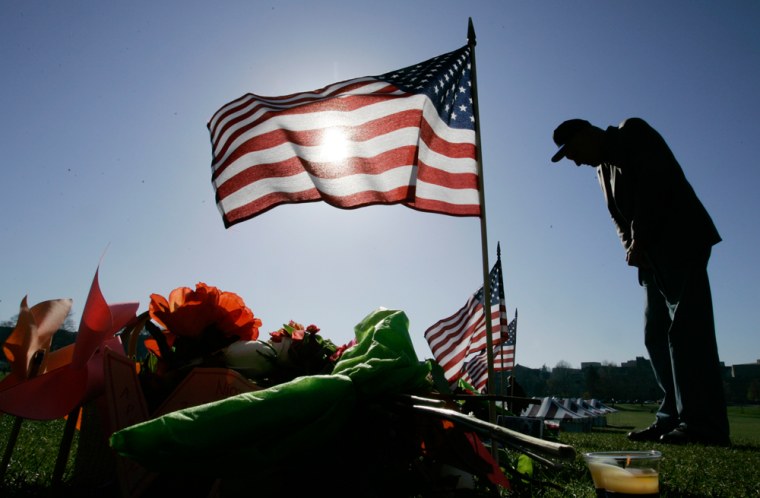Most families of victims of the Virginia Tech shootings have agreed to an $11 million state settlement to compensate families who lost loved ones, pay survivors' medical costs and avoid a court battle over whether anyone besides the gunman was to blame.
Gov. Timothy M. Kaine said Thursday a "substantial majority" of families of victims of the Virginia Tech shootings agreed to the settlement.
Peter Grenier and Douglas Fierberg, who represent 21 families, said the settlement was worth more than $11 million, but neither they nor the governor would discuss its terms until final papers are drawn in a few days.
Grenier and Fierberg said seriously injured victims "will be well compensated and have their health care needs taken care of forever," and that families who lost loved ones would be "similarly compensated and cared for."
"We want to make sure the settlement is fiscally responsible for the commonwealth," Kaine said, "but it's kind of a fair balance of a variety of interests."
Kaine called the agreement "very positive," but noted that families who have not agreed to it still could file suit. Notice must be filed by April 16.
Criticism over delay in reporting first deaths
Seung-Hui Cho, a mentally disturbed student, killed 32 victims and wounded two dozen others at Virginia Tech on April 16, 2007, before committing suicide. Twenty-two families had previously filed notice with the state that they would sue.
Cho killed two people in a dormitory, then killed 30 more two hours later in a classroom building before taking his own life.
University officials have been criticized for waiting about two hours before informing students and employees about the first shootings, which police initially thought were an act of domestic violence.
The gunman had been ruled a danger to himself during a court commitment hearing in 2005 and was ordered to receive outpatient mental health care, but never received treatment.
Attorney General Bob McDonnell's office had no comment on the settlement, spokesman Tucker Martin said.
It was not immediately clear whether the settlement differed from an earlier state proposal, the details of which were obtained last month by The Associated Press.
That proposal called for representatives of each of those killed to receive $100,000. A pool of $800,000 was set aside for the injured in the plan, with individuals eligible to receive up to $100,000 apiece. Families of those killed could seek additional money from a $1.75 million hardship fund, and other money was to be set aside for attorneys' fees and a fund for charities.
The settlement also would give the injured and victims' families a chance to meet with the governor and university officials several times to discuss the mass shootings and changes on campus since then.
'Senseless tragedy'
Grenier and Fierberg said the settlement "will also result in the release of previously undisclosed facts and information turned up by our firm's investigation that will enable the public to better understand the events which caused this senseless tragedy."
By accepting the proposal, family members gave up the right to sue the state government, the school, the local governments serving Virginia Tech and the community services board that provides mental-health services in the area.
Once the final agreement is drawn up and signed by families, settlements on behalf of those killed will be submitted for court approval.
In October, the families and surviving victims received payments ranging from $11,500 to $208,000 from the Hokie Spirit Memorial Fund, set up in the days after the shootings to handle donations that poured into the school. That fund will remain open for contributions to scholarships for five years.
Families originally were told they had to respond to the state's offer by March 31, but the deadline was extended.
